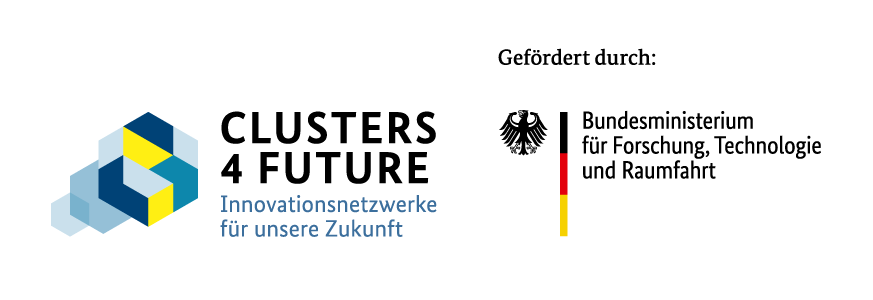Transfer as the key to future viability
Germany is one of the world's leading research nations. However, the path from scientific discovery to concrete application is often long and rocky. Every year, tens of thousands of new technologies are created at German universities - but too few make the leap into the market or society.
Last week, on May 7 and 8, 2025, over 100 experts from the future clusters, Leading-Edge Clusters and research campuses came together in Jülich to work on precisely this. The aim: to share successful transfer strategies, learn from each other and shape new paths together.
Exchange, insights and new alliances
The meeting was organized by Project Management Jülich (PtJ) and the Federal Ministry of Research, Technology and Space (BMFTR). The focus was on the central question:
How do we scale up the transfer from research to application by a factor of 10?
The range of topics was as broad as it was forward-looking:
From neuromorphic hardware to personalized gene therapies, quantum computing, marine research and hydrogen technologies through to sustainable mobility - as we are driving forward in the MCube cluster.
MCube as a driving force for sustainable mobility
MCube - the Munich Cluster for the Future of Mobility in Metropolitan Regions - was also represented with strong contributions. Carolin Zimmer, Yulika Zebuhr and Oliver May-Beckmann contributed perspectives on governance, impact and visibility to the political discourse.
Close cooperation between politics, administration, science and business is essential, especially when it comes to complex future issues such as sustainable mobility. The transfer can only succeed if we create structures that have a long-term effect. It is therefore all the more gratifying that the BMBF has invited MCube to report on successful exchange formats and their impact - a strong signal of the relevance of well-structured dialog processes.
Joint mission: strengthening Germany's innovative power
One key outcome of the meeting was that the German innovation clusters will work even more closely together in future. Because despite all the thematic differences, we are united by a common task:
Making Germany fit for the future.
Thank you very much!
Many thanks to the entire team at Project Management Jülich and the Federal Ministry of Research, Technology and Space for the excellent organization. And a big thank you to all participants for the open, inspiring and constructive exchange.
Only if we are prepared to share experiences - whether success or failure - can we improve together.
Participating clusters (selection):
MCube | NeuroSys | Ocean Technology Campus Rostock | PROXIDRUGS | QSens | SaxoCell | SupplHyInno | CNATM | curATime | ETOS | nanodiag BW | QVLS | SEMECO | ThWIC | bioRN | Energy2Grid and many more.
A new study by MCube Consulting on behalf of Zukunft Nahverkehr (ZNV) shows: Local public transport generates three times as much revenue for the German economy as it costs.
Mobility is at the heart of Germany's economic and innovative strength, the key to climate neutrality and the core of everyday life.
Carolin Zimmer from the Chair of Settlement Structure and Transport Planning and Sebastian Preiß from the Hans Sauer Foundation explain in an interview what the project has achieved and what makes it special.
Major award for a strong team: MCube Consulting receives the Innovation Award of the City of Munich - for a solution that reduces administrative workload, improves security and shows how research enables real change.
If Munich bids for the Olympics again, it will not do so arbitrarily - but with vision, attitude and a clear plan.
MCube had its own stand at the trade fair and brought together over 100 mobility pioneers at the "Bridging City Innovation Ecosystems" event above the rooftops of Barcelona.
What does the bus of tomorrow need to look like to convince as many people as possible to change buses voluntarily?
Our experts gave keynote speeches on why we need fair, inclusive mobility that is suitable for everyday use for everyone.
The city council of Landsberg am Lech has unanimously approved the new traffic development plan (VEP).
Why we should learn to celebrate construction sites - and finally shape mobility based on facts and together.
No results available

What is MOSAIQ?
Imagine something: There is more space for people. The streets have more trees and plants. Everyone can get around better. That's how your Schwabing-West district could be in the future. How would you like your district to be? We want to talk to you about it!
The project is called MOSAIQ. MOSAIQ is a research∙project. MOSAIQ means: Mobility and urban climate in the future city∙part. The Technical University of Munich is leading the project.
What is MOSAIQ about?
MOSAIQ wants to make the streets in the city∙part more beautiful. People should feel comfortable there. There should be more space. For meetings and plants, for example. You can help decide what is tried out in the Stadt∙teil. The ideas come from you. Some ideas will be tried out on the streets for a certain period of time.
The aim of MOSAIQ is to make urban districts good places to live.
At the same time, the climate in the city should improve. And people should be able to move around the city easily.
What is happening in the district?